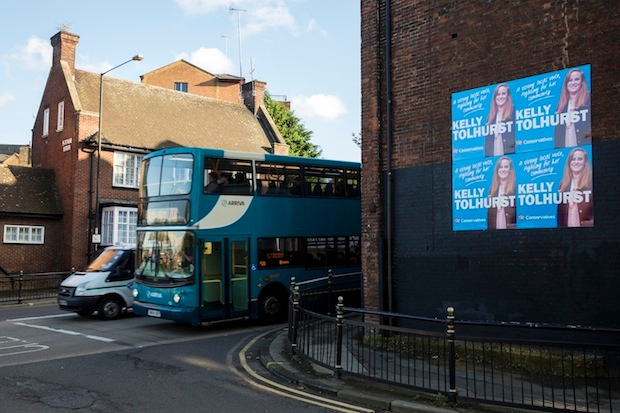Labour might be mired in misery this week, but at least it can take comfort that around the corner is the Rochester by-election, which the Conservatives look set to lose. Not one MP returning from campaigning against their former colleague Mark Reckless honestly thinks they’ll win, even if they tweet nice things and post aggressive videos.
Let’s just remind ourselves of why losing this constituency is particularly painful for the Conservatives. They spent their conference calling Reckless a ‘dickhead‘ and saying they thought they could win the by-election because he was a liar, and he didn’t have the same personal appeal as Douglas Carswell in a constituency considered far less Ukip-friendly. MPs attended a parliamentary party meeting when they returned to Westminster where they were told that Rochester and Strood voters were ‘more thoughtful’ than those in Clacton and therefore more likely to dismiss Ukip.
But now the party is realising that even ‘thoughtful’ voters fancy backing Nigel Farage’s party, even if it is just for a by-election and not in a general election, that even apparently unfriendly seats can become friendly and that all the defiance in the world doesn’t necessarily guarantee a victory against a treacherous colleague. The consequences are that Tory MPs who thought it unwise to leave their party and defect to Ukip because their seats weren’t sufficiently friendly will think again. Unless the Conservatives manage to present compelling evidence that they really can win Rochester back in six months’ time (rather than that they think they can win it back, as they thought they could win the by-election), they may find more defections on their hands.
Defections aside, though, talks are already underway between prominent members of the Right of the Conservative party about how to use a loss in Rochester to squeeze further concessions from the Prime Minister over his European renegotiation. I understand that there was a meeting of key members of the No Turning Back and Cornerstone groups this week where they discussed two options and how to best pressure the Prime Minister.
The first was for a group of eurosceptics to tell David Cameron that he must set as a red line for his renegotiation of Britain’s relationship with Europe that Britain gets a special exemption from freedom of movement within the European Union and that this country will be allowed to adopt quotas for EU migrants. The group will say he must set this out clearly before Christmas, and make clear that he will campaign for Britain to leave the European Union if he does not get this.
The second option was to demand that the Prime Minister repeal or amend the European Communities Act (Bernard Jenkin led calls for this to be amended at the start of this year) so that Parliament can veto European laws.
The meeting was, according to a number of those there, rather disorganised and did not reach a specific conclusion on the strategy, nor did it inspire those planning to rebel on the European Arrest Warrant with great confidence that this revolt has been properly managed from the dissenters’ side. But there seemed to be a consensus that whatever they pressure the Prime Minister for, they should initially do so in private by having a meeting with him in Number 10. They are keen that their colleagues from the 2010 intake, who are growing increasingly grumpy with those they see as troublemakers, do not lose their temper over public pressure which appears to split the party once more over Europe. Whether they maintain that strategy of pressuring Cameron in private remains to be seen.







Comments